Results
-
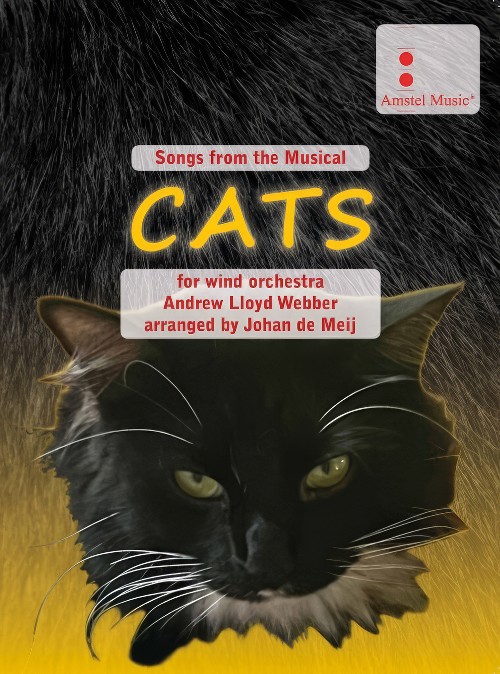 £118.99
£118.99Cats (Songs from the musical) (Concert Band - Score and Parts) - Lloyd Webber, Andrew - De Meij, Johan
The musical Cats, with music by Andrew Lloyd Webber is based on the 1939 poetry collection Old Possum's Book of Practical Cats by T.S. Eliot. It became Lloyd Webber's third great success, after the musicals Jesus Christ Superstar and Evita. He began setting Eliot's poems to music in 1977, and the compositions were first presented as a song cycle in 1980. Producer Cameron Mackintosh then recruited director Trevor Nunn and choreographer Gillian Lynne to turn the songs into a complete musical. Cats became one of the longest-running shows in West End and Broadway history. It received its world premiere at the New London Theatre in 1981, where it played for 21 record-breaking years and almost 9,000 performances. The following year, Cats opened at New York's Winter Garden Theatre, its home for the next 18 years, garnering seven 1983 Tony Awards, including Best Musical. The show returned to Broadway in 2016, where it had a successful pre-tour run at the Neil Simon Theatre. Cats has been presented in over 30 countries, translated into 16 languages, and seen by more than 73 million people worldwide. Lloyd Webber's magnificent musical score includes the poignant hit song Memory, which has been recorded by over 150 artists, from Barbra Streisand to Liberace to Barry Manilow. It took 7,486 chandelier crashes for Lloyd Webber's The Phantom of the Opera to take over from Cats as the longest-running show in Broadway history in January 2006.Duration: 8.15
Estimated dispatch 7-14 working days
-
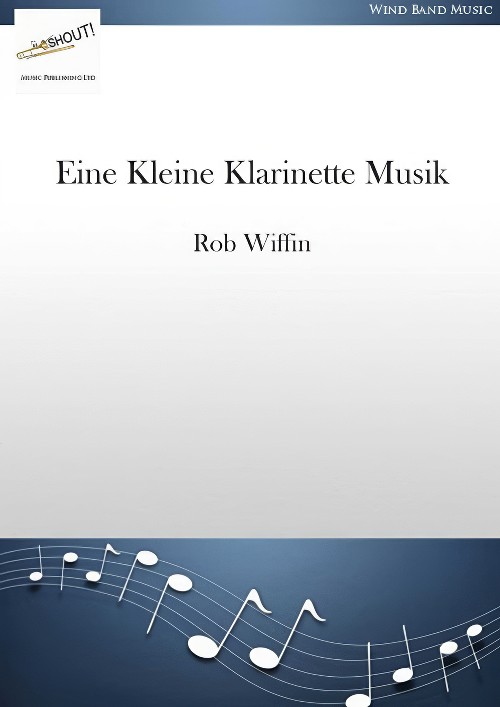 £44.95
£44.95Eine Kleine Klarinette Musik (Clarinet Solo with Concert Band - Score and Parts) - Wiffin, Rob
A solo for solo clarinet and band featuring the well-known tune from Mozart's Eine kleine Nachtmusik. I have always thought that Woody Herman's Golden Wedding is a great showpiece for clarinet. He takes a tune entitled La Cinquantaine by the French Romantic composer Jean Gabriel-Marie (1852 - 1928) and sets it as a big band swing piece complete with Krupa Toms. In seeking to emulate it I suddenly realised that the Rondo from Mozart's Eine Kleine Nachtmusik K.525 had very much the same character if I presented it in a minor key. It was then really just a matter of organizing the various sections, setting them in a swing manner and adding a cadenza-like passage. There is, of course, a strong connection between Mozart and the clarinet. It was fun to write and will hopefully be a fun solo vehicle for clarinettists. - Rob Wiffin. Duration: 3.30
Estimated dispatch 7-14 working days
-
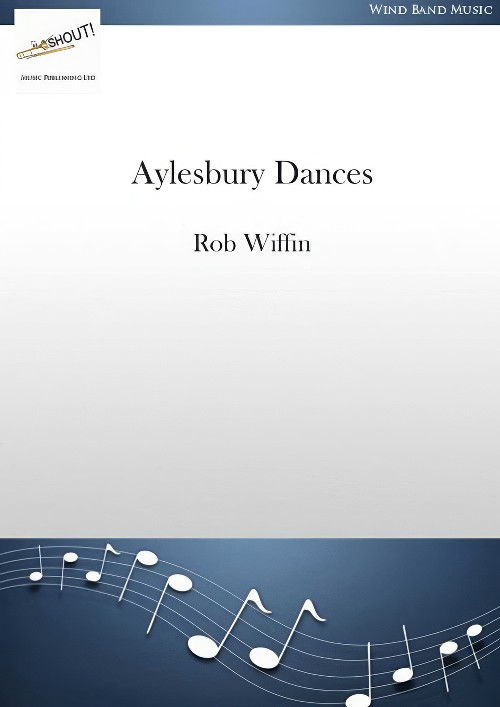 £69.95
£69.95Aylesbury Dances (Concert Band - Score and Parts) - Wiffin, Rob
The suite Aylesbury Dances was commissioned by the Aylesbury Concert Band to mark the occasion of their 25th Anniversary in 2019. Its three movements depict different aspects of Aylesbury: I. Pavane: The Town - Having read something of the town's history and its architecture I decided I wanted to write something ceremonial with the feel of music from Tudor times. Aylesbury was given its charter and borough status in 1554 by Mary Tudor so I took that as my starting point but then added some harmony that moves forward in time. This fits with the town's motto: Semper Prorsum (Always forward) and also with the Band's evolution from Aylesbury Town Band to Aylesbury Community Concert Band to Aylesbury Concert Band. The music can be defined as a pavane, or a cortege. The sense of procession is slightly disturbed by a 'Blue Leanie' moment. The Blue Leanie is an iconic Aylesbury building, an oblique rhombic prism which stands at an angle of 17% inclination. I took a quaver out of the time signature (I know the maths don't work!) to reflect this and added some bluer harmony at that point. This opening movement gives a sense of the grandeur and heritage of Aylesbury town and a chance for my friends from the brass section to warm up! II. Siciliana: Waterside - To balance the outer two movements, the middle movement of the suite has a slow lilting 6/8 rhythm. It is in the style of a Siciliana, a dance form originating in the baroque era. It is a graceful, tender and melancholic dance, cast here in a minor key and featuring the dark voice of the cor anglais. The Siciliana was often linked with pastoral scenes and Aylesbury itself sits amid some beautiful countryside. It may, therefore, seem a bit of a stretch to call this movement 'Waterside', especially as Aylesbury is so far from the sea, but the town has a theatre of that name and that was the genesis for this particular music. There is a statue of Ronnie Barker in the grounds of the Waterside theatre as he started his career in repertory theatre in Aylesbury, so I included a fleeting reference to the theme music of the comedy programme 'Open all Hours'. III. Frolic: Ducks in a Row - It was impossible to write a piece connected with Aylesbury without considering the famous Aylesbury ducks. Duck rearing was a major industry in the town in the 19th century. The white Aylesbury Duck is a symbol of the town, appearing on its coat of arms and in the logo of the Aylesbury Concert Band! This movement is all about trying to get the little darlings in a row so they can sing their 'Duck Chorus' together but they keep on scattering, flying off or swimming away as quickly as they can manage. It's a bit like watching ducks disperse when my dog jumps into the stream after them. Eventually we get more of them in a row - even though they protest. Hidden amongst the ducks is a reference to Erica Miller, saxophonist and chairman of the band, and there's even a veiled reference to a shark in the hope of getting them out of the water. Ducks in a Row is a fun romp bringing this suite of Aylesbury Dances to a suitably celebratory conclusion.- Rob Wiffin.Duration: 9.15
Estimated dispatch 7-14 working days
-
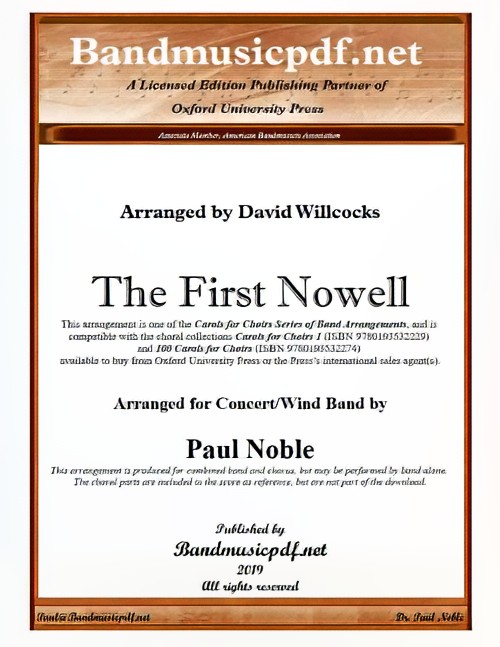 £75.00
£75.00The First Nowell (Concert Band with Optional Choir - Score and Parts) - Noble & Willcocks
The First Nowell is one of the oldest Christmas folk songs going back to at least the 1600's. We cannot be sure who wrote it, but both France and England claim it as part of their heritage. The spelling of the word Noel would indicate it to be French, however, England claims the original spelling was the English version Nowell. The singing of The First Nowell and the lighting of the yule log became tradition among the peasants in England and was passed down from generation to generation. It was not until 1833 that it was published and soon after was sung in Church services. This arrangement is one of the Series of Band Arrangements compatible with David Willcocks Carols for Choirs Book 1 (#38).
Estimated dispatch 7-14 working days
-
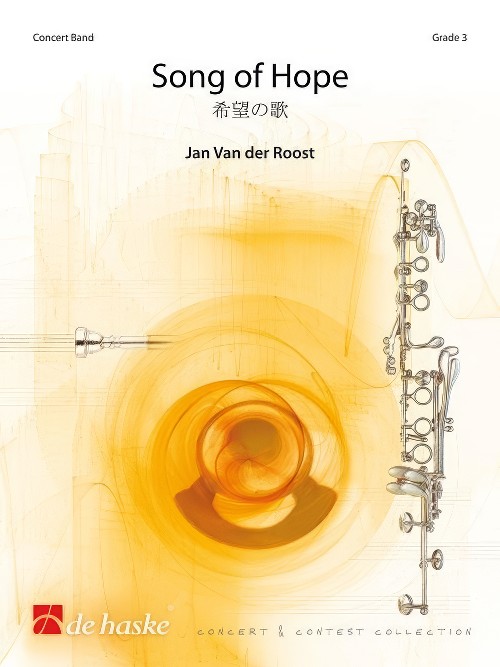 £104.99
£104.99Song of Hope (Concert Band - Score and Parts) - Van der Roost, Jan
2011 was a disastrous year for Japan: on March 11 the northeast of the country suffered a violent earthquake, which triggered a huge tsunami and caused massive damage to people and the environment. The ensuing problems with the nuclear reactor at Fukushima only increased the misery: a black day in the country's history... One almost inevitable consequence of such dramatic circumstances is the particular damage suffered by the cultural arts. And so it was in Japan: various high school wind orchestras in the effected areas lost their practice rooms and/or instruments. It will take a long time before the damage suffered is repaired - and it will take great effort to overcome the psychological effects, too. Focusing on the latter, Yutada Nishida (director of The Bandwagon radio program) asked a few composers for a simple work that could be played by many orchestras. It just so happened that the Osakan Philharmonic Winds (with whom Jan Van der Roost had conducted a concert exclusively of his own works on September 25th) had had a similar idea. This concert saw the baptism of Song of Hope. This piece immediately struck a chord with musicians and audience alike: it begins bleakly in the low register and evolves to a more open, optimistic close. There really is hope for better times!Duration: 4:45
Estimated dispatch 7-14 working days
-
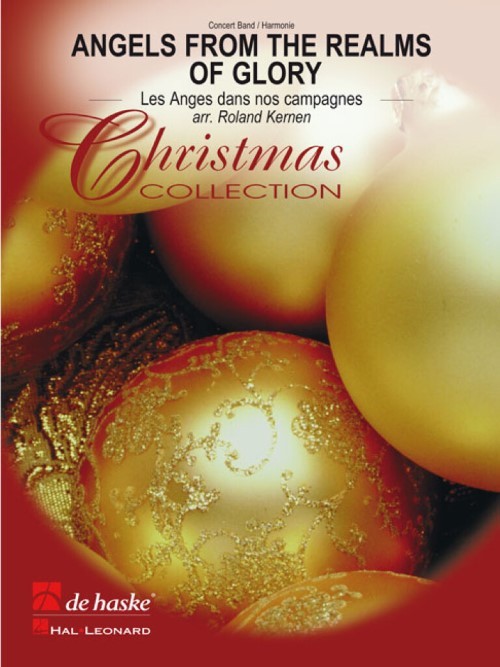 £94.99
£94.99Angels from the Realms of Glory (Concert Band - Score and Parts) - Kernen, Roland
The title of this clever arrangement reveals the Christmas song it is based on. The melody can be traced back to a French folksong from the 18th century which is now known around the world. In France it is called Les anges dans nos campagnes, in Germany it is most widely known as Engel auf den Feldern singen and in England it was originally called Angels From the Realms of Glory but it often known as Angels We Have Heard on High. Everyone will rejoice upon hearing the 'Gloria in excelsis Deo' refrain!Duration: 5:45
Estimated dispatch 7-14 working days
-
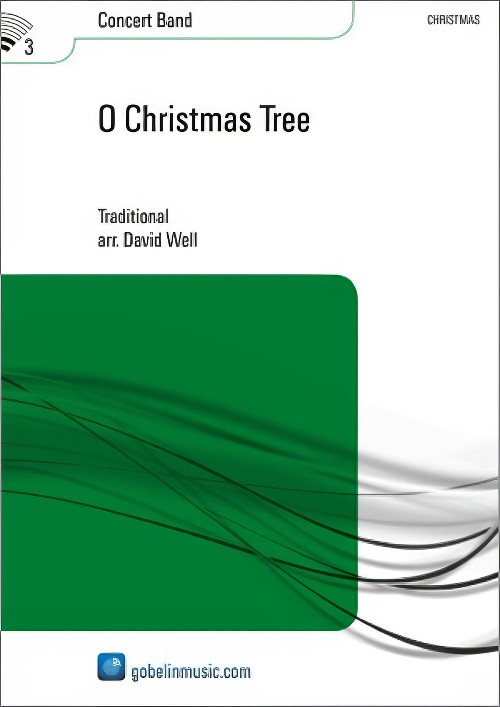 £94.99
£94.99O Christmas Tree (Concert Band - Score and Parts) - Well, David
The tradition of the Christmas tree in Western Europe dates back to a time long before any Christianization had taken place. During the severely cold winter nights, so it was believed, evil spirits tried to 'kill' nature. Needle-leaved trees were the only ones which kept their green colour throughout the year, and therefore became symbols of immortality. These 'living' trees, said to be the work of benign spirits, were brought into people's houses to ward off evil, life-threatening powers. In the 14th century people first started to decorate Christmas trees. It was a pagan custom, originated by the inhabitants of Alsace. This custom was taken over by the Church in the course of the 15th and 16th century. At first the decoration consisted mainly of edibles, such as apples and wafers, but later small presents were added. Legend has it that the reformer Martin Luther was the first person to decorate a Christmas tree with candles. The flickering candle flames were meant to create the image of a starry sky in which Christ's apparition could be recognized. The German organ-player Ernst Anschutz from Leipzig was the first person to notate the song 'O Tannenbaum', the melody being a well-known folk song. Next to 'Stille Nacht' 'O Tannenbaum' is the most famous German Christmas song, now known throughout the world. In the United States of America the melody of 'O Tannenbaum' has even been used in four States (among which the State of Maryland) for their State song. In David Well's arrangement the song is first heard as many of us know it. After this introduction, however, it is transformed into a solid rock version, and the beat has been changed. In the second part the familiar three-four time is back, but here the rhythm is different from the original. After the richly ornamented rock beat the basic theme can be heard once again and the composition is concluded in a festive manner.Duration: 3:15
Estimated dispatch 7-14 working days
-
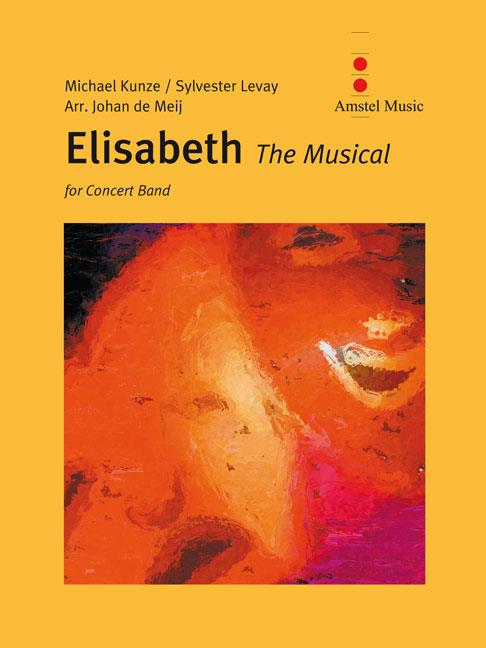 £118.99
£118.99Elisabeth (Concert Band - Score and Parts) - Levay & Kunze - De Meij, Johan
The world premiere of the musical Elisabeth took place in Vienna on September 3, 1992. From the great acclaim with which the musical was received, it became clear that the life of the Empress of Austria still appeals to the imagination. Although Elisabeth's life (1837-1898) as an Empress has a fairy-tale-like beginning, it takes a gloomy turn. In this production, Luigi Lucheni, the man who finally takes her life, tells her story. Death plays a major role throughout Elisabeth's life. In the musical, an equally mysterious and attractive man portrays the phenomenon of death, seducing her to the realm of death time after time. Elisabeth's life resembles a fairy tale when she marries the Emperor Franz Joseph at the age of sixteen. Her mother-in-law, Archduchess Sophie, does not make it easy on Elisabeth. But it is life itself that puts the Empress to the test. First, her youngest daughter dies. Then, not long after her son Rudolf is born, her happiness is clouded when her mother-in-law decides she must take pity on him. After her husband's unfaithfulness and Sophie's death, Elisabeth is so disillusioned that she chooses a travelling existence without realizing her husband and her son, Rudolf, miss her. Rudolf's loneliness is one of the reasons he commits suicide. The accumulation of disappointments in Elisabeth's life almost drives her into the arms of Death. In the end, however, it is Lucheni who kills her.Duration: 8.30
Estimated dispatch 7-14 working days
-
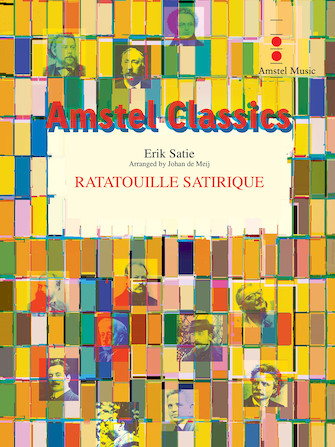 £128.00
£128.00Ratatouille Satirique (Concert Band - Score and Parts) - Satie, Erik - De Meij, Johan
Erik Satie, born in Honfleur in Normandy (France) in 1866 is undoubtedly one of the most striking personalities in the history of French music. He composed in various, often quite divergent, styles. Besides light-hearted, entertaining works he also wrote several serious compositions, among which the three ballets: Parade, Rel che and Les Aventures de Mercure. However his piano pieces, such as Trois Gymnopedies or Gnossiennes will remain his most popular compositions. Satie co-operated with almost all great artists of his time: Pablo Picasso, Jean Cocteau, Sergej Diaghilev and Georges Braque and the composers Darius Milhaud (Le Groupe des Six) and Claude Debussy. Johan de Meij made an orchestration of three short pieces by Erik Satie: I. Prelude (from: Jack in the Box) II. Reverie (from: Trois petites pieces montees) III. Marche: Le Piccadilly (1904) It was only after Satie's death in 1925 that the manuscript of the piano piece Jack in the Box was recovered. Satie himself thought he had lost the manuscript in a bus. When his flat in Arceuil was cleaned out, a small notebook was discovered behind his piano and it contained the manuscript which was assumed to be lost forever. The R?verie (De l'Enfance de Pantagruel) is an extract from Trois petites pieces montees, originally composed for small symphony orchestra. In this suite it is meant as a restful intermezzo. It is clear that, as with Milhaud (La Creation du Monde) and Debussy (Golliwogg's Cakewalk; Le Petit Negre), it is hard to deny obvious influences of jazz music in Erik Satie's compositions. Le Piccadilly, dating from 1904, displays a lot of similarities with the compositions of Scott Joplin. Duration: 7.00
Estimated dispatch 7-14 working days
-
 £60.99
£60.99Jamaica Wind Band Set (Score & Parts)
Jamaica is an island in the Caribbean. In 1494 it was discovered by Christopher Columbus, who used it as private property until 1509. After some skirmishes it fell under British rule and the sugar trade on the island flourished. After the abolition of slavery in 1834 it was only granted Home Rule in 1944, but it remained a member of the British Commonwealth of Nations. Whereas the export of cane sugar used to be Jamaica's main export product for many years, nowadays music has taken over this role. At first American music used to be very popular on the island. Later, however, Jamaican musicians started to experiment and thus in the end created their own musical style called Reggae. Well-known Reggae musicians are Bob Marley and Peter Tosh. The most important instruments used in Reggae are the bass and the drums. Together they form the base for the style: the riddim. A bass drum accent on the second and fourth beat are characteristic of a typically reggae drum beat. To this syncopic patterns are often added. The rhythm guitarist plays chords in a characteristic Reggae rhythm, not on, but between the beats. 02:30
Estimated dispatch 7-14 working days
